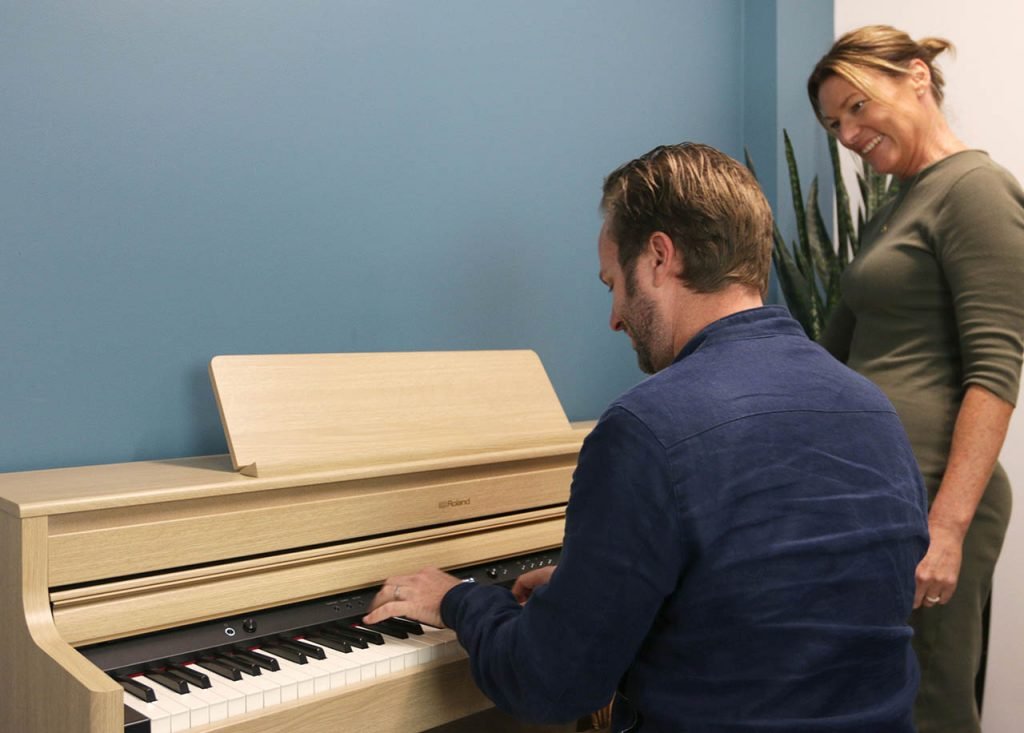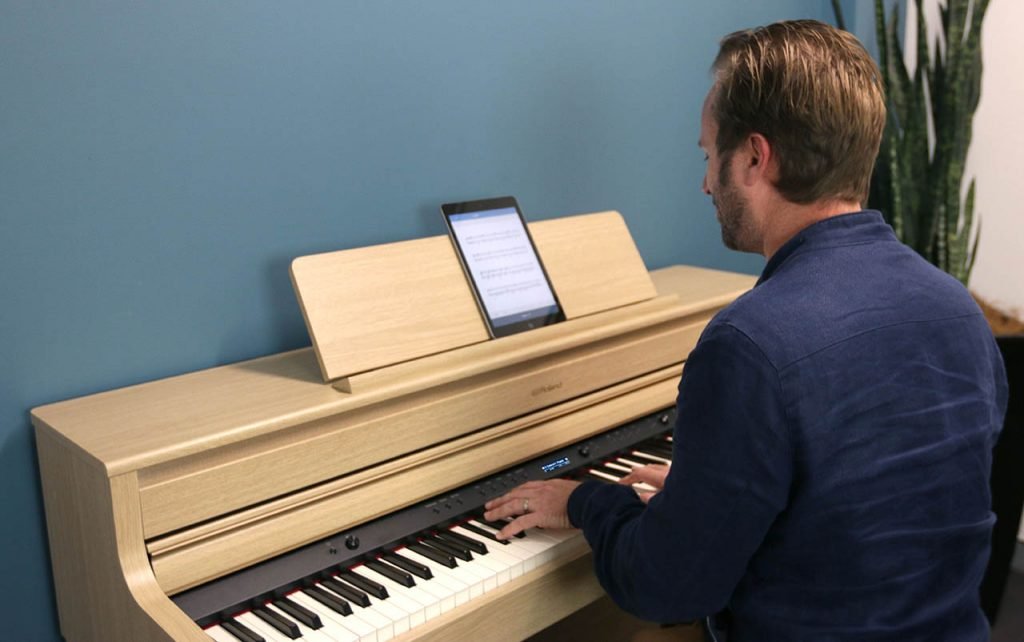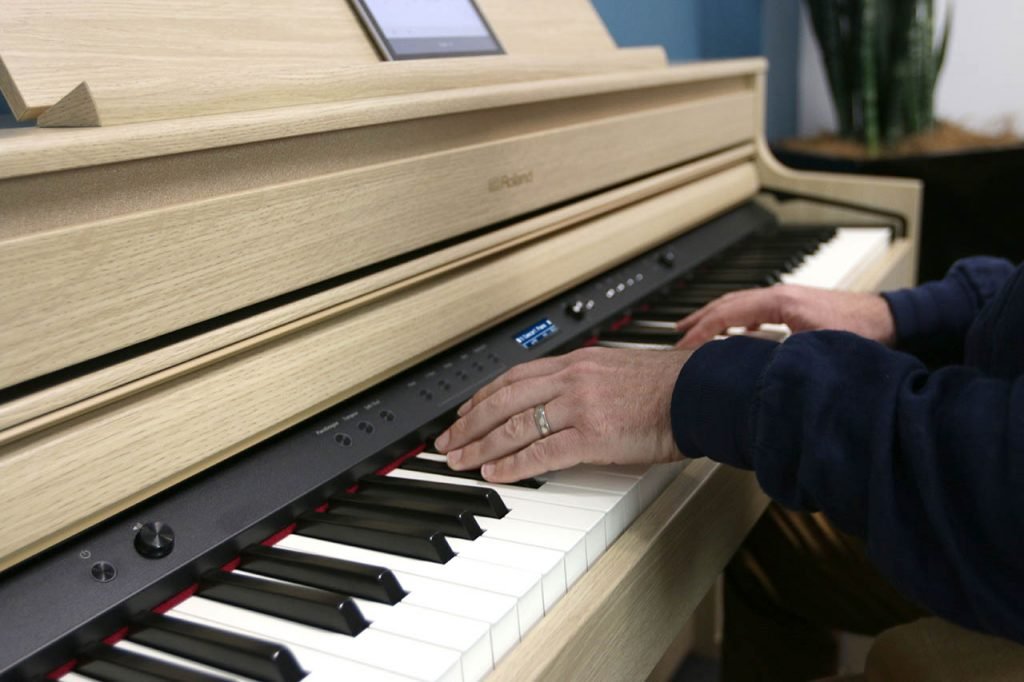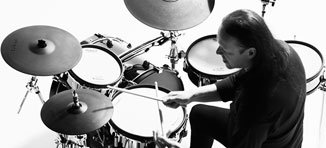In this article, Richard Avery shares his personal experiences of learning piano (and negotiating marriage) as an adult. He has included links to posts and videos that he found useful along the way.
PART ONE
Learning to Play Piano
Learning to play the piano as an adult should be fun and can be challenging. Importantly, if you don’t enjoy yourself, the chances of you sticking with it are pretty slim!
I played piano for about a year when I was seven. I’m not sure whose idea it was but I can remember thinking of it as a chore. I didn’t like the songs that I was learning and my teacher was terrifying. I had lessons once a week and I had to be ‘reminded’ to practice every afternoon.
After a summer break my mum and I had a talk. She was tired of hassling me. We both agreed that my unique talents were better focused elsewhere, probably watching TV and playing in the backyard.
I have always loved music and throughout my teenage years and early adulthood I wished that I had stuck with the piano (also French, Spanish and gymnastics!). Like most people, my life had different plans. I got a job, married a woman far to kind, had kids and bluffed my way into a scary mortgage.
Not a Mid-Life Crisis
As time passed my life settled. My kids found other people to play with and my wife had new people to save. Even our dog had strayed from my orbit. I had time to reflect on what life could have been and even what life could potentially be…
In hindsight, this had all of the symptoms of a mid-life crisis.
Anyway, learning piano seemed like a better idea than speeding off into the sunset in a red sports car. It was one of the best decisions I have ever made, especially considering I love music and I am less than fond of traffic.
I was 47 years old. I went online and started to research ‘the best ways to learn piano’. Most of the information I found was for kids. I found this a bit odd. I didn’t want to learn how to ride a skateboard; I wanted to learn a timeless instrument.
Fortunately, after a bit of digging, I found some great advice. Also, I wasn’t alone. As it turns out, learning to play piano when you are an adult is a thing.
Recommended article: What to expect when learning to play piano as an adult

Benefits of Learning Piano When You Are Older
One of the wisest things my new, kind and often forgiving piano teacher told me was:
“For older students, enthusiasm is more important than talent and enjoyment is more important than discipline”.
I sort of thought that she’d given up on me before we’d even started!
Now, after playing for several years, I really understand what she was saying. There are some clear advantages in learning to play piano when you are older.
You Are Learning to Play Piano Because:
- You want to play piano
This goes back to enthusiasm. I can remember having to learn piano as a kid and it wasn’t much fun. To this day, when I hear ‘The Itsy Bitsy Spider’ and ‘Mary Had a Little Lamb’, I get a sense of impending doom. - You know the type of music you want to play
This is a big one! When I started playing again, I went straight to learning my favorite songs. No ‘E-i-E-i-Os’ for this budding pianist. - You can choose how you learn (by ear, teacher, apps, by your mistakes etc.)
There are lots of ways to learn the piano, especially with digital pianos, YouTube and Bluetooth technology. I am a huge fan of teachers too! - You can choose when you will learn (night time, weekends, public holidays)
I use headphones and a digital piano, and it sounds like I am playing a Steinway in an auditorium (badly). I can also play anytime with out disturbing the family. - You know why you want to learn (relaxation, enjoyment, stardom etc.)
This was an easy one for me. I just wanted to play (and sing) the songs that I love. I also wanted to impress my wife and kids, but that‘s been a little more difficult that I thought… - You can learn at your own pace (walk, jog, catch me if you can)
This can be good and bad. I think if you are doing all of the things above correctly (enjoyment, playing what you want to play etc.) then you will surprise yourself at how quickly you learn to play.
Recommended Article: Benefits of learning to play piano as an adult
Before We Begin…
Before we rush in, let’s take a breath. We need to be smart about what we learn and how we learn it!
Quick story: I taught design and programming for ten years at university. In that time, I discovered that adults learn very differently to children. Children have the capacity to study random modules and then combine their knowledge to create a project.
Adults work best with ‘project-based’ learning. This begins with understanding what the final goal is and then working step-by-step to achieve it. How does this relate to learning piano? I am glad you asked 🙂
I love music. I really love my favourite songs and I am excited when I learn to play them. Before I start learning a song I already know how it should sound. Then I go through the process of putting the chords and melodies together and presto! This is classic project-based learning.
This is very different to starting off by learning to read notation, studying music theory and practicing scales. That being said, now that I have scratched the itch of being able to ‘play’ a few of my favourite songs, I am learning to sight-read music.
Recommended article: The top five benefits of digital sheet music for pianists
Setting Reasonable Expectations
If your ambition is to play at home to relax and maybe even jam with your friends, then that is absolutely achievable. If you want to play your favorite song(s) and you are willing to put in a bit of practice, that is also achievable.
If you are thinking ‘concert pianist’ or ‘touring professional’ then this article probably isn’t right for you…
6 Simple Suggestions Before Learning Piano

- Get a piano in your home to practice and play
- Clarify what you want to achieve (modest goals)
- Choose a suitable learning method (online, teacher, apps etc.)
- Pick an easy song to learn that you love
- Create a regular practice schedule and get started
- Don’t schedule your concert dates!
Recommended Article: Advantages of Renting a Musical Instrument
And By The Way…
Piano playing;
- Does wonders for your health
- Is stimulating for your brain
- Gets the creative juices flowing
- Brings you closer to others (unless you really suck!)
- Is loads of fun!
PART TWO
What’s the best way to learn to play piano?
There is no right or wrong way to learn piano. One thing I learnt from my teaching days is that every ‘student’ is different. That being said, there are some great learning choices available, so keep things interesting and try a few of them!

1. Technology is Making Learning to Play Piano Easier
One of the biggest advantages of learning on a digital piano is the availability of technologies to help you learn. There are literally hundreds of APPS out there as well as online learning sites that provide everything you need to get started and to grow as a player.
A few of my favorite online learning resources are:
One of the best things about APPS is that they ‘gamify’ learning to read music. What would normally be repetitious practice is transformed into an epic human versus machine challenge and you have to beat your last score for speed and accuracy. Well, maybe not an epic challenge but it definitely qualifies as human versus machine.
There are heaps of free and pay options available in this space so it’s easy to find an online course that suits your level of playing and preferred learning style.
Here are a few articles that I found useful:
Bluetooth could change the way you play piano
How to connect your Roland Piano to Bluetooth
2. Find a Great Piano Teacher
Not everyone wants to be taught by a teacher but if you are willing, it can save you time and provide you with some much-needed direction. A teacher can also be the perfect compliment to other learning methods.
I bought a digital piano and set it up in the living room. With enthusiasm I started learning a song that I loved using YouTube. This was going to be easy! Well, I lasted for a week and the song sort of turned out to be a dud.
Disheartened, I didn’t play for a bit and the piano just sat there, almost taunting me for not spending time with it.
A good friend of ours suggested I take a few lessons and gave me the number of a piano teacher. I called and booked a lesson and by the end of our first class I was excited to learn again.
My teacher started by asking me what I wanted from learning to play piano. I then played her the song I had (ruined) been working on and I could see her smile. I was awful. She got me to break the song down into small pieces and play one hand at a time, very slowly. Wow, nice song!
So simple. I was pretending to be better than I was. She was able to point out what I was doing wrong and easily shift me in the right direction.
Another thing she told me was that, “music is meant to be shared”. When you play with someone or for someone it changes, and becomes something new. I still go to her once every two weeks.
Some useful articles:
How to find the right piano teacher as an adult
How to get the most from your piano practice time
3. Learning to Play Piano Via YouTube and Videos
I am always impressed by the quality of information available online. Last night I learnt to play ‘All of Me’ by John Legend.
I use an iPad with my digital piano and it’s really easy to go through video tutorials at my own (snail) pace. It’s the easy access to resources like this that have made learning piano so enjoyable.
Recommended article: 10 essential video tips for starting to learn piano
4. Learning to Play Piano by Ear and by ‘Rote’
I found playing by ear a bit tricky when I was first starting. I could usually work out the melody but I struggled with the left-hand chords. Nevertheless, I found that just trying to work out a song really helped train my ear. Now that I have a better understanding of chords I can work out most songs fairly easily.
I resisted learning to read music so learning through repetition (Rote) suited me. The trick was to practice as often as possible so that I didn’t forget what I had learnt. I also found that repeating the same section over and over really helped my playing (it also drove my family insane when I forgot to use headphones!)
Here are a few articles that I found useful:
An easy guide to piano styles and modes
10 Tips to Becoming a Better Piano Player
- Start off with simple pieces of music. Relax and take your time.
- Listen carefully to the song you are trying to learn to get a feel for the dynamics and emotion used to ‘tell the story’.
- When you have a hard time playing a section of music, break it down into smaller pieces. Play one hand at a time and repeat the pattern until it becomes easy.
- Then practice playing each part of the song. When the physical playing becomes second nature it is much easier to perform the whole song with a natural relaxed ‘feel’.
- When you learn a complex section of music, go back and put it in context by playing the sections before and after it.
- Look for familiar patterns and harmonies in every song you learn/play. This will help your understanding of songwriting and your knowledge of the instrument.
- Record your performances so that you can hear areas that need improvement and get a sense of your progress.
- Find a great teacher who can help you with your technique and offer suggestions on ways to learn.
- Practice every day if possible and remember to have fun! Keep your learning interesting by trying new techniques.
- Play with other people to improve your timing and listening skills.
PART THREE
Choosing the right piano

There’s a TON of information out there about choosing the right piano. I am one of those people that do a lot of research and I think I’ve spent way too much time looking at all of the options.
I guess the first decision you have to make is whether to buy an acoustic piano or a digital piano. They are both great options so this is really a personal choice that may be influenced by your living situation.
I chose a digital piano for the following reasons:
- Space
We live in an apartment and I needed a piano that was fairly portable so it could be moved around if required. - Sound
A great sound is important, even when you are just learning an instrument. I did a lot of research and I was impressed at how rich digital pianos sound. The fact that you can add a bit of reverb and choose between different pianos is a bonus. - Technology
I wanted to learn using apps so Bluetooth technology was a must. I also liked the idea of having onboard metronomes and being able to record my ‘performances’. - Noise
Did I mention that I was living in an apartment? Being able to play with headphones and practice quietly day or night has been a huge plus for me. It has also saved my marriage! - Performance and feel
I learnt fairly early in my research that I should find a piano with a weighted keyboard and 88 keys to replicate an acoustic piano. I am really glad I did! - Price
I had no visions of myself becoming a professional musician so I didn’t want to pay a fortune. There were some great digital pianos in my price range.
Here are a few articles that I found useful:
How to choose between digital and acoustic when buying a piano
5 things you need to know before you go to a piano shop
Six benefits of learning on a digital piano
In Conclusion
Learning to play piano as an adult isn’t as hard as I thought it would be. That being said, I have set the bar at a reasonable height by focusing on enjoyment rather than excellence. I also love listening to music even more than before and I have started to write my own songs.
If you are on the fence about learning to play, my advice is to follow your heart. You never know where it will take you. If you don’t like it, you can always sell the piano and put the money towards a red sports car.
About the Author
Richard Avery is university lecturer, designer and writer. He is married with two children and lives in Sydney, Australia.



